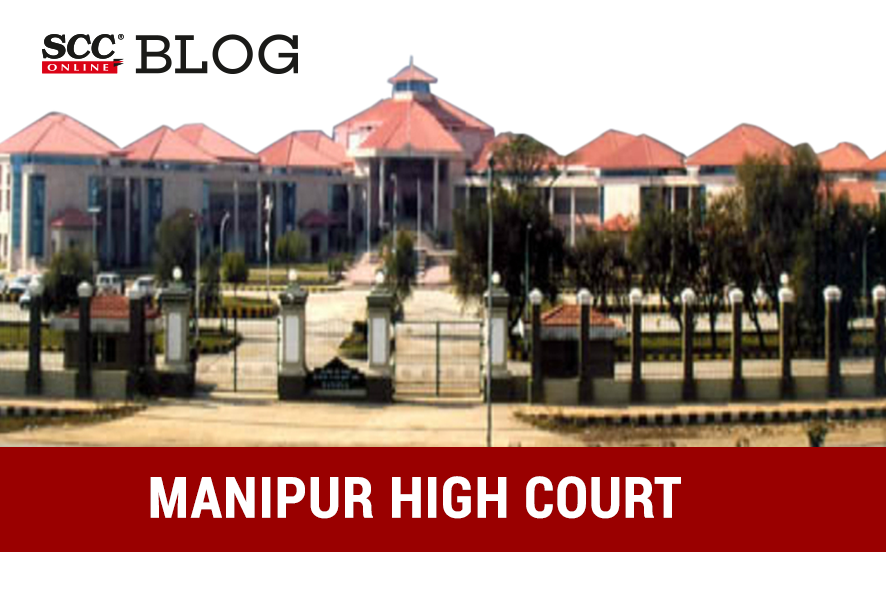Manipur High Court: In a case wherein an appeal was filed under Section 173 of the Motor Vehicles Act, 1988 (“Act”) against the final judgment and award passed by the Presiding Officer, Motor Accident Claims Tribunal (“Tribunal”), wherein the Tribunal directed the appellant to pay Rs. 36,67,500 to the respondents for the death of Hari Prasad Khatiwada, husband of Respondent 1, who succumbed to his injuries in a road accident, a Single Judge Bench of *A. Guneshwar Sharma, J. held that appropriate multiplier for deceased, aged 35 years should be 16 in place of 17 and one-third amount had to be deducted as personal expenses from the income of the deceased instead of one-fourth. Moreover, the Court held that only Rs. 40,000 and Rs. 15,000 should be awarded for loss of consortium and funeral expenses, respectively.
Background
In the present case, while the deceased, Hari Prasad Khatiwada was returning by riding his TVS Jupiter Disc Le (scooter) from Imphal towards his resident, he was knocked down by Tata Truck and at the time of the incident, another vehicle Tata Truck was also involved. The deceased got severe injury and later, succumbed to his injuries. The respondents filed a claim before the Tribunal for payment of compensation for Rs. 45,00,000 for the death of Hari Prasad Khatiwada, but the appellant denied any liability of compensation and submitted that the accident happened in rash and negligent driving of the deceased himself who was driving two wheelers at the same time. The Tribunal directed the appellant to pay Rs. 36,67,500 only to the claimant as compensation along with an interest at 6% per annum. Thus, the appellant filed the present appeal against the decision of the Motor Accident Claims Tribunal.
Submissions on behalf of the Appellants
It was submitted that when the claimants-respondents themselves had impleaded the insurer as a party-respondent in the claim case before the learned Tribunal, it could prefer an appeal without the leave of the Court under Section 170 of the Act.
Submissions on behalf of the Respondents
It was submitted that in the proceedings before the Motor Accident Claims Tribunal, Manipur, the appellant had not taken leave of the Tribunal to defend the case as provided under Section 170 of the Act, therefore, the appellant could not prefer an appeal under Section 173 of the Act except for limited grounds and it was prayed that the appeal may be dismissed as not maintainable on this ground alone.
Analysis, Law, and Decision
The Court relied on United India Insurance Co. Ltd. v. Shila Datta, (2011) 10 SCC 509, wherein it was held that “if the insurer was already a respondent (having been impleaded as a party-respondent), it need not seek the permission of the Tribunal under Section 170 of the Act to raise grounds other than those mentioned in Section 149(2) of the Act”. Therefore, the Court held that the present appeal filed by the appellant/insurer on merit was maintainable in the present form as it had been impleaded as a party-respondent by the claimants-respondents themselves in the proceeding before the Motor Accident Claims Tribunal, Manipur.
The Court relied on Sarla Verma v. DTC, (2009) 6 SCC 121 (“Sarla Verma”) and National Insurance Co. Ltd. v. Pranay Sethi, (2017)16 SCC 680 (“Pranay Sethi”), and held that “appropriate multiplier for deceased, aged 35 years should be 16 in place of 17”.
The Court noted that there were four claimants-respondents in the claim petition including the wife of the deceased, minor daughter, father of the deceased and mother of the deceased and on perusal of the materials on record including the deposition of the claimants-respondents, there was no document/ statement to the effect that the father of the deceased was dependent on him. The Court after relying on Sarla Verma held that since Respondent 3 was not dependent on the deceased, therefore, he would not be entitled to any claim/compensation and accordingly, there would be only three dependents of the deceased.
The Court held that in view of Sarla Verma, one-third had to be deducted as personal expenses from the income of the deceased instead of one-fourth and w.r.t. loss of consortium given as Rs. 1,00,000, the Court after relying on Pranay Sethi held that it should be Rs. 40,000 only and the excessive amount of Rs. 60,000 should be deducted. Further, the Court relied on Raj Bala v. Rakeja Begam, 2022 SCC OnLine SC 1453 and held that regarding the award of Rs. 1,00,000 towards the loss of care and guidance for the minor children, the minor children would be entitled to Rs. 40,000 only. The Court opined that since there was only one minor child of the deceased, she would be entitled to a sum of Rs. 40,000 only towards loss of care and guidance for minor children. So, the excessive amount of Rs. 60,000 had to be deducted. The Court after relying on Pranay Sethi held that the amount of funeral expenses was Rs. 15,000 and accordingly, the excessive amount of Rs. 10,000 had to be deducted towards funeral expenses.
Therefore, the Court directed the appellant to pay Rs. 29,75,000 only to Respondents 1,2 and 4 along with interest @6% per annum from the date of filing from the claim date. The Court held that Respondents 1, 2 and 4 were entitled to Rs. 29,75,000 in equal shares and the share of the minor Respondent 2 should be kept as fixed deposit in a scheduled bank till she attained the age of minority, and no withdrawal should be made from the fixed deposit amount made in favour of the minor Respondent 2 without the leave of the Tribunal.
[Branch Manager, New India Assurance Co. Ltd. v. Sanju Khatiwada, 2023 SCC OnLine Mani 88, decided on 24-2-2023]
Advocates who appeared in this case:
For the Appellant: Advocate A. Denni Sharma;
For the Respondents: Advocate H. Dijen Sharma;
Advocate H. Chandrakumar.
*Judgment authored by: Justice A. Guneshwar Sharma







